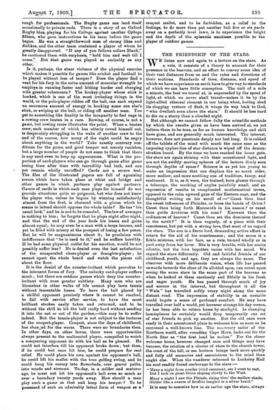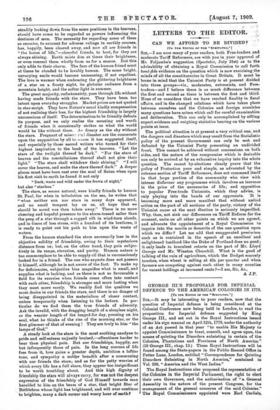THE FRIENDSHIP OF THE STARS.
WE listen now and again to a lecture on the stars. As . a rule, it consists of a theory to account for their presence in the heavens, and an effort to convey some idea of their vast distances from us and the rates and directions of their motions. Standards of time, distance, and speed of which we have experience on earth have to give way to standards of which we can have little conception. The unit of a mile a minute, the best we travel at, is superseded by the speed of light, at which we never shall travel—unless it be by the light-allied ethereal element in our being when, having shed its clogging vesture of flesh, it wings its way back to God, " who dwelleth even above the stars." It should be less bard to die on a starry than a clouded night.
But although we cannot follow fully the scientific methods by which the results given us have been arrived at, we yet believe them to be true, as far as human knowledge and skill have gone, and are generally much interested. The interest, however, does not penetrate deeply nor last long. It is rubbed off the tablets of the mind with much the same ease as the imposing cypher-line of star distance is wiped off the demon- stration board. By the time we have reached the home gate, the stars are again shining with their accustomed light, and are not the swiftly moving spheres of the lecture dimly seen through depths of space P Science is as yet too young to. make an impression that can displace the so much older, more mellow, and more soothing one of tradition, fancy, and sentiment. It is, as it were, the trained, keen glance through a telescope, the marking of angles painfully small, and an expression' of results in complicated mathematical terms, opposed to the calm upward gaze of the Eastern sage, and the thoughtful writing on his scroll of :—" Canst thou bind the sweet influences of Pleiades, or loose the bands of Orion ? Canst thou bring forth Mazzaroth in his season ? or canst thou guide Arcturus with his sons ? Knowest thou the ordinances of heaven ? Canst thou set the dominion thereof in the earth ?" It is thus vaguely, of a piece with their remoteness, but yet with a strong love, that most of us regard the stars. The sun is a fierce lord, demanding active effort in return for the aid of his countenance; and the moon is a fickle mistress, with her face, as a rule, turned wholly or in. part away from her lover. She is very lovable, with her arnica silentia, but the love begotten varies with her mood. We regard the stars differently. Old and faithful friends of our childhood, youth, and age, they are always the same. The observer with more deliberate vision, when life has passed onwards towards the close of its allotted span, can count upon seeing the same stars in the same part of the heavens as when he looked at them carelessly and fitfully in his fresh and eager youth. He has passed through much of joy and sorrow in the interval, but throughout it all the " Wain " has travelled softly every night along the same distant road. The impression of stability in an unstable world begets a sense of profound comfort. He may have travelled over half a world, yet however strange his day scenesi he has been able to return home by starlight. In changing hemispheres he certainly would drop temporarily one set of star friends to pick up another. But the old ones were ready in their aocustomed place to welcome him as soon as he recrossed a well-known line. The sea-weary sailor of the Northern world, after rounding Cape Horn, looks out for the North Star as " the first land he makes." For the closer welcome home, however changed men and things may have become, the relation of a cluster of stars to the church tower, the crest of the hill, or sea horizon brings back more quickly and fully old memories and associations to the mind than aught else. When the wanderer returned to Locksley Hall his soul readily found anchorage to the stars :— "Many a night from yonder ivied casement, ere I went to rest,
Did I look on great Orion sloping slowly to the West. Many a night I saw the Pleiads, rising thro' the mellow shade, Glitter like a swarm of fireflies tangled in a silver braid." It is easy to conceive how in an earlier age the stars, -always steadily looking down froin the same positions in the heavens, should have come to be regarded as powers influencing the destinies of men. The necessity for regarding some of them as enemies, to account for adverse rulings in earthly courses, has, happily, been cleared away, and now all are friends in "the house of life,"—cheerful friends, to boot, for they are always shining. Earth mists dim at times their brightness, or even conceal them wholly from us for a season. But this only adds to their charm. The face of the human friend must at times be clouded to he lovably human. The same bright, unvarying smile would become unmeaning, if not repellent. The love is warmer when embracing the glittering brightness of a star on a frosty night, its globular radiance from a mountain height, and the softer light in summer.
The great majority, unfortunately, pass through life without having made friends with the stars. They have been too intent upon everyday struggles. Market prices are not quoted in star-script. They have Nature's usual kindly compensation of not realising their loss, for the highest friendship is largely unconscious of itself. The determination to be friendly defeats its pUrpose, and we only realise the meaning and worth of friends when it occasionally strikes us what the world would be like without them. As dreary as the sky without the stars. Pregnant of miser, rul disaster are the comments upon the supposition by all to whom it has suggested itself, and especially by those sacred writers who turned for their highest inspiration to the book of the heavens. "Let the stars of the twilight thereof be dark." "For the stars of heaven and the constellations thereof shall not give their light." " The stars shall withdraw their shining." "I will cover the heaven, and make the stars thereof dark." A deeper gloom must have been cast over the soul of Satan when upon his first visit to earth he found it not only
"Dark, waste and wild under the frown of night," but also " starless."
The stars, as seems natural, were kindly friends to human St. Paul, for when in tribulation on the sea, he writes that " when neither sun nor stars in many days appeared, and no small tempest lay on us, all hope that we should be saved was then taken away." There is no more cheering and hopeful presence to the storm-tossed sailor than the peep of a star through a ragged rift in wind-torn clouds, and in times of less stress, with a hundred of its brethren, it is ready to point out his path to him upon the waste of waters.
From the human standard the stars necessarily lose in the objective solidity of friendship, owing to their mysterious distance from us; but, on the other hand, they gain subjec- tively in its range, elevation, and purity. Human nature is too commonplace to be able to supply all that is unconsciously looked for in a friend. The one who expects does not possess it himself, although he is not aware of the fact: To make up for deficiencies, subjective bias magnifies what is small, and supplies what is lacking, and as there is not so favourable a field for its exercise when friends come often into contact with each other, friendship is stronger and more lasting when they meet more rarely. We readily find the qualities we most desire in our friends the stars, and there is no danger of being disappointed in the materialism of closer contact, unless temporarily when listening to the lecture. In par- ticular do we find them the true friends of adversity. Ask the invalid, with the dragging length of a sleepless night, or the wearier length of the longed-for day, pressing on his soul, what he thinks of the rise of the morning star, or the first glimmer of that of evening ! They are truly to him " the lamps of God-" A steady look at the stars is the most soothing anodyne to pride and self-esteem unjustly bruised,—oftentimes harder to bear than physical pain. But our friendships, happily, are
but infrequently those of pain. In the long courses of life free from it, love gains a greater depth, ambition a loftier tone, and sympathy a nobler breadth after a communing with our friends the stars; and as for the petty worries of which every life has a full share, they appear too insignificant to be worth troubling about. And this high dignity of friendship the stars will always carry, for was not the deepest expression of the friendship of God Himself towards man heralded to him on the beam of a star, that bright Star of Bethlehem whose light has brightened, and will ever continue to brighten, many a dark corner and weary hour of earth P







































 Previous page
Previous page